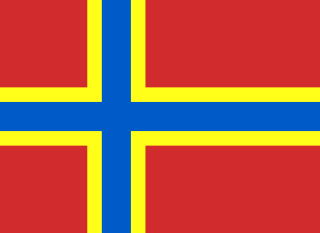
Orkney, also known as the Orkney Islands or, the often deprecated, Orkneys, is an archipelago off the north coast of Scotland. Part of the Northern Isles along with Shetland, Orkney is 10 miles (16 km) north of Caithness and has about 70 islands, of which 20 are inhabited. The largest island, the Mainland, has an area of 523 square kilometres (202 sq mi), making it the sixth-largest Scottish island and the tenth-largest island in the British Isles. Orkney's largest settlement, and also its administrative centre, is Kirkwall.

The Mainland, also known as Hrossey and Pomona, is the main island of Orkney, Scotland. Both of Orkney's burghs, Kirkwall and Stromness, lie on the island, which is also the heart of Orkney's ferry and air connections.

Flotta is a small island in Orkney, Scotland, lying in Scapa Flow. The island is known for its large oil terminal and is linked by Orkney Ferries to Houton on the Orkney Mainland, Lyness on Hoy and Longhope on South Walls. The island has a population of 80.
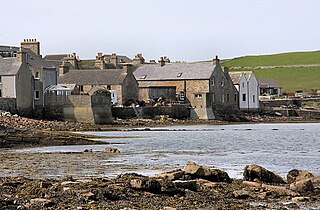
South Ronaldsay is one of the Orkney Islands off the north coast of Scotland. It is linked to the Orkney Mainland by the Churchill Barriers, running via Burray, Glimps Holm and Lamb Holm.
Burray is one of the Orkney Islands in Scotland. It lies to the east of Scapa Flow and is one of a chain of islands linked by the Churchill Barriers.

North Ronaldsay is the northernmost island in the Orkney archipelago of Scotland. With an area of 690 hectares (2.7 sq mi), it is the fourteenth-largest. It is mentioned in the Orkneyinga saga; in modern times it is known for its historic lighthouse, migratory bird life and unusual breed of sheep.

Switha is a small uninhabited island towards the south of Orkney, Scotland, approximately 41 hectares in area.

George Mackay Brown was a Scottish poet, author and dramatist with a distinctly Orcadian character. He is widely regarded as one of the great Scottish poets of the 20th century.

The North Ronaldsay or Orkney is a breed of sheep from North Ronaldsay, the northernmost island of Orkney, off the north coast of Scotland. It belongs to the Northern European short-tailed sheep group of breeds, and has evolved without much cross-breeding with modern breeds. It is a smaller sheep than most, with the rams (males) horned and ewes (females) mostly hornless. It was formerly kept primarily for wool, but now the two largest flocks are feral, one on North Ronaldsay and another on the Orkney island of Auskerry. The Rare Breeds Survival Trust lists the breed as a priority on its 2021–2022 watchlist, and they are in danger of extinction, with fewer than 600 registered breeding females in the United Kingdom.
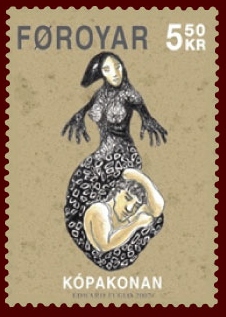
Selkies are mythological creatures that can shapeshift between seal and human forms by removing or putting on their seal skin. They feature prominently in the oral traditions and mythology of various cultures, especially those of Celtic and Norse origin. The term “selkie” derives from the Scots word for “seal”, and is also spelled as silkies, sylkies, or selchies. Selkies are sometimes referred to as selkie folk, meaning 'seal folk'. Selkies are mainly associated with the Northern Isles of Scotland, where they are said to live as seals in the sea but shed their skin to become human on land.
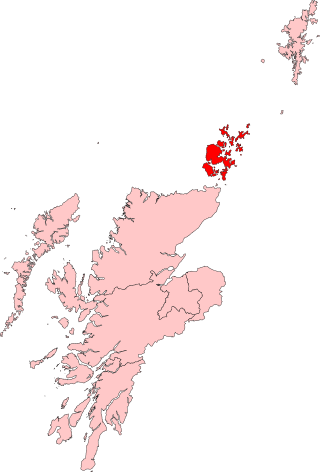
Orkney is a constituency of the Scottish Parliament (Holyrood) covering the council area of Orkney. It elects one Member of the Scottish Parliament (MSP) by the first past the post method of election. It is also one of eight constituencies in the Highlands and Islands electoral region, which elects seven additional members, in addition to the eight constituency MSPs, to produce a form of proportional representation for the region as a whole.

The Bishop of Orkney was the ecclesiastical head of the Diocese of Orkney, one of thirteen medieval bishoprics of Scotland. It included both Orkney and Shetland. It was based for almost all of its history at St Magnus Cathedral, Kirkwall.

The Churchill Barriers are four causeways in the Orkney islands with a total length of 2.3 kilometres (1.4 mi). They link the Orkney Mainland in the north to the island of South Ronaldsay via Burray and the two smaller islands of Lamb Holm and Glimps Holm.

Rögnvald Kali Kolsson, also known as Saint Ronald of Orkney, was a Norwegian earl of Orkney who came to be regarded as a Christian saint. Two of the Orkney Islands are named after Rögnvald, namely North Ronaldsay and South Ronaldsay.
Luke Sutherland born in London, brought up in Scotland. A full-time member of two independent bands and an occasional member of Mogwai, active also as a music producer, he has also published a number of written works.

Orcadians, also known as Orkneymen, are an ethnic group native to the Orkney Islands, who speak an Orcadian dialect of the Scots language, a West Germanic language, and share a common history, culture and ancestry. Speaking Norn, a native North Germanic language into the 19th or 20th century, Orcadians descend significantly from North Germanic peoples, with around a third of their ancestry derived from Scandinavia, including a majority of their patrilineal line. According to anthropological study, the Orcadian ethnic composition is similar to that of Icelandic people; a comparable islander ethnicity of North Germanic origin.

The A961 is a single-carriageway road on the eastern side of Scapa Flow in the Orkney Islands, connecting the town of Kirkwall on the Orkney Mainland to Burwick at the southern end of South Ronaldsay.
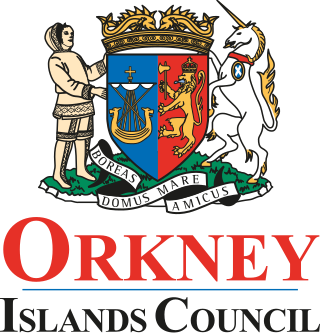
The Orkney Islands Council, is the local authority for Orkney, Scotland. It was established in 1975 by the Local Government (Scotland) Act 1973 and was largely unaffected by the Scottish local government changes of the mid-1990s.
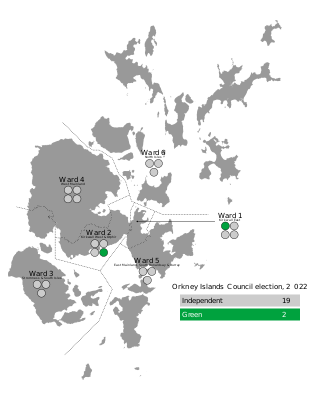
Elections to the Orkney Islands Council were held on 5 May 2022, the same day as the 31 other Scottish local government elections. The election used the six wards created under the Local Governance (Scotland) Act 2004, with 21 councillors being elected. Each ward elected either 3 or 4 members, using the STV electoral system.
















